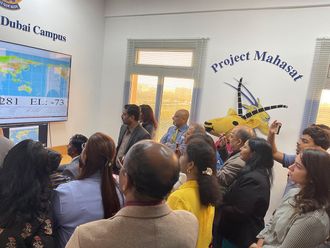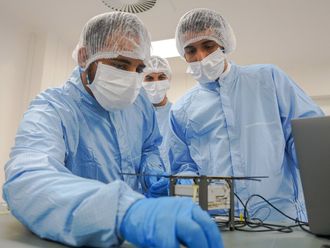
Abby Solomon suffers from a one-in-a-billion genetic syndrome: after just about an hour without food, she begins to starve. She sleeps in snatches. In her dreams she gorges on french fries. But as soon as she wakes up and nibbles a few bites, she feels full, so she ends up consuming very few calories. At 5 feet 10 inches tall, she weighs 44kg.
Now 21 years old, she is one of the few people in the world to survive into adulthood with neonatal progeroid syndrome, a condition that results from damage to the FBN1 gene. This mutation mangles noses and eyes and destroys the layer of fat under the skin so that even teenagers look middle-aged. It also interferes with the body’s ability to make a hormone called asprosin, which regulates blood sugar. Atul Chopra, a medical geneticist at Baylor College of Medicine, told me that people with the disorder don’t experience ordinary hunger — instead they waver on the edge of hypoglycaemia and must constantly snack to keep from passing out.
And yet when I asked Solomon if she wished she could magically repair her damaged gene, she answered without hesitation: “I wouldn’t change it for anything.”
This is because her painful body may hold the clues to a lifesaving treatment for millions of people with obesity and diabetes.
Chopra told me that, as far as medical science is concerned, Solomon is worth thousands of the rest of us. By observing her, scientists can see how a hormone deficiency affects a living person, from her thoughts to her liver function. Several years ago, she spent a day inside a metabolic chamber in a lab so that Chopra could measure everything she breathed and ate. The results showed that Solomon takes in about half the calories of a typical woman her age, and also expends half as much energy.
“Nothing comes close to starting with people who are naturally different,” he said. This is why he searches out patients at the extreme ends of the spectrum — those who are wired to weigh 36kg to 172kg. He said, “We have the opportunity to help a bigger swathe of humanity when we learn from these outliers.”
In 2013, after hearing about Solomon’s unusual condition from another patient, he asked her to visit his clinic. Solomon warned him that she would be able to carry on a conversation for only 15 minutes before she needed to snack on chips or a cookie. That remark inspired a revelation. Chopra realised that “she had to eat small, sugary meals all day to stay alive, because her body was constantly running out of glucose”, he said.
The clue led Chopra and his colleagues to their discovery of the blood-sugar-regulating hormone, which they named asprosin. Solomon’s natural asprosin deficiency keeps her on the brink of starvation, but Chopra’s hope is that an artificial compound that blocks asprosin could be used as a treatment for obesity. He and his team have tested such a compound on mice, and found that it can reverse insulin resistance and weight gain.
Of course, for decades, scientists have attempted to develop a drug that could flip the appetite switch — and they’ve always come up short. Still, Chopra believes asprosin is an unusually promising hormone for drug development “because we have a living, breathing human who has the natural depletion of this hormone in her blood”. Since Solomon is essentially immune to obesity and diabetes, it’s reasonable to assume that the compound would affect other people in the same way.
I wondered whether the research would also lead to a treatment for Solomon, who needs more asprosin rather than less of it. Unfortunately, the hormone would have to be injected several times a day. Solomon says she already experiences enough pain, thank you. Besides, asprosin would not be able to fix the worst parts of the disorder — the damage that mutation has wrought on her eyes and nose.
If you’ve already heard of neonatal progeroid syndrome, it’s probably because of Lizzie Velasquez. Aside from Solomon, she may be the only American to suffer from the disorder. Velasquez, 27, weighs less than 31kg and is blind in one eye. She has endured vicious ridicule and bullying since childhood. But after internet trolls called her the “world’s ugliest woman”, she decided to flip the script and delivered a heart-wrenching TED Talk about inner beauty that reached millions of viewers.
Solomon’s genetic mutation is slightly different from Velasquez’s, and the damage to her face and body weight is much less severe. Although strangers treat her rudely because they assume she has an eating disorder, she can melt into a crowd without being noticed. More than stigma, she has been worn down by surgeries.
In 2013, she enrolled as an undergraduate at the University of Texas with dreams of becoming a biologist and medical researcher. But because she suffered from headaches, exhaustion and deteriorating vision, she had to move back home, where her parents and five siblings could look after her.
“This has been the most difficult year of my life,” she wrote to her Facebook friends in August. Doctors rebuilt her nasal passages, which had been blocked by bone spurs; then they replaced the lens in one of her eyes to prevent blindness. A photo she posted on Facebook shows her in a hospital bed with her hair tucked under a blue surgical cap; she’s giving a thumbs up. The caption reads, “My second home”.
The bright spot in Solomon’s difficult year came in April, when Chopra and his team announced her role in the discovery of asprosin. “I can’t even begin to wrap my head around how damn cool that is,” she said.
Indeed, Solomon has made it her life’s work to collaborate with the medical researchers who poke and prod her; for years, she has given them small parts of herself — blood and saliva and even her own breath. She’s glad to do it. She points out that she has benefited from tricky surgeries that have saved her eyesight — procedures that exist because earlier patients suffered them. “That’s why I volunteer for every research study,” she said, “even if I’m really nervous about it.”
This autumn, I had a chance to spend time with Solomon when she travelled up from Austin, Texas, to help her younger sister move into an apartment near Boston University. One Sunday, I met three of the Solomons — Solomon, her sister and their mum — for brunch.
Solomon turned out to be a poised woman in wire-rimmed glasses with chestnut-coloured curls gathered into a ponytail. Her skin is beautifully clear and translucent, but also prematurely wrinkled into deep folds around her mouth, because she lacks collagen and bone. She told me that even when she was 15 years old, waiters would mistake her for a grown woman and offer her the wine menu.
She had spent the day before in her sister’s dorm room, unpacking boxes. This must have been bittersweet — she herself had recently dropped out of college because of her vision problems and gruelling surgical schedule.
Still, she and her mother were making the best of the situation — they had decided to drive the scenic route home, stopping off at a vineyard in Virginia. Solomon may not experience hunger in the usual way, but she loves to sample flavours and foods. Now, in the restaurant, she wandered around the buffet tables happily sizing up the temptations.
Soon, the conversation shifted from her unusual appetite to her struggles with anxiety. “Sometimes in a place like this,” she said, gesturing at the diners in the restaurant around us, “I feel like everyone’s staring at me.”
“But they’re not,” her mother said. “I mean, check it out.” Indeed, people were swarming around the cheese table and elbowing their way into lines. No one paid the least bit of attention to Solomon and her gaunt frame.
However, after we filed out of the restaurant and said our goodbyes in the hotel lobby, I turned to leave and noticed a woman openly gawking. “Well, that’s not ordinary anorexia,” the woman pronounced to her companion. “That’s about the worst case I’ve seen,” she added, with relish. I realised that Solomon must have to deal with this kind of behaviour all the time — stares and stage whispers and judgmental comments. No wonder she’s anxious.
After all, people regard weight as a moral issue. Despite plentiful evidence to the contrary, we assume that people’s minds can control their metabolism — and that they merely need to make a decision to gain or lose weight. But studies demonstrate that this is simply not true. For instance, the contestants on the “Biggest Loser” TV show became paragons of self-control. And yet a recent study showed that even these incredibly disciplined dieters gained all the weight back. In the long run, our hormones win.
Chopra cited research that suggests that a vast majority of dieters will fail to reach or maintain their goal. “That means there’s no point in talking about willpower,” he said. Our ancestors survived because they were hungry, and that’s why many parts of our bodies, from fat cells to our brain cells, have been designed to send up alarms when we cut calories. So how to short-circuit the mechanism? Scientists know surprisingly little about that. Even after decades of research, “we don’t have any single drug that’s effective against obesity”, Chopra said.
Until recently, many scientists thought of fat cells as inert — like butter stored in the refrigerator. But in the last decade, that idea has undergone a radical revision. Researchers have discovered dozens of hormones produced by fat cells — indicating that these cells send out powerful signals that tweak our attention, feelings, cravings and habits. For instance, our fat cells use asprosin to communicate with the liver and brain, drive the production of glucose and influence our eating behaviour.
“One of the questions I often get is this: How are we still discovering hormones?” Chopra said. “How is that possible? My answer is that we’re just at the tip of the iceberg. Asprosin is not the last hormone left to discover. In the next few decades, we’re going to find many, many others.”
To do that, we will depend in large part on the generosity of people such as Solomon, whose bodies hold the clues to human hunger. We should exalt the outliers among us. But all too often we treat them shabbily. When she was 17 years old, Velasquez found a YouTube video of herself plastered with poisonous comments such as “Kill it with fire!!!” and “Just put a gun to your head.” We are way too cruel to those with genetic differences.
Solomon told me that she has struggled with crushing depression — in part because her deteriorating eyesight made it impossible to keep up with college classes or live independently. But this autumn, she underwent a wildly successful series of eye surgeries and is relishing her newfound freedom: “I got a car yesterday and I’m starting to drive again. It’s all happening,” she reported.
Recently, she urged her Twitter friends to “go outside and look at the moon. The clouds floating by are insanely beautiful. I can actually see it and I’m utterly mesmerised.” Unlike the rest of us, she is taking nothing for granted.
–New York Times News Service
Pagan Kennedy is the author of “Inventology: How We Dream Up Things That Change the World”.













